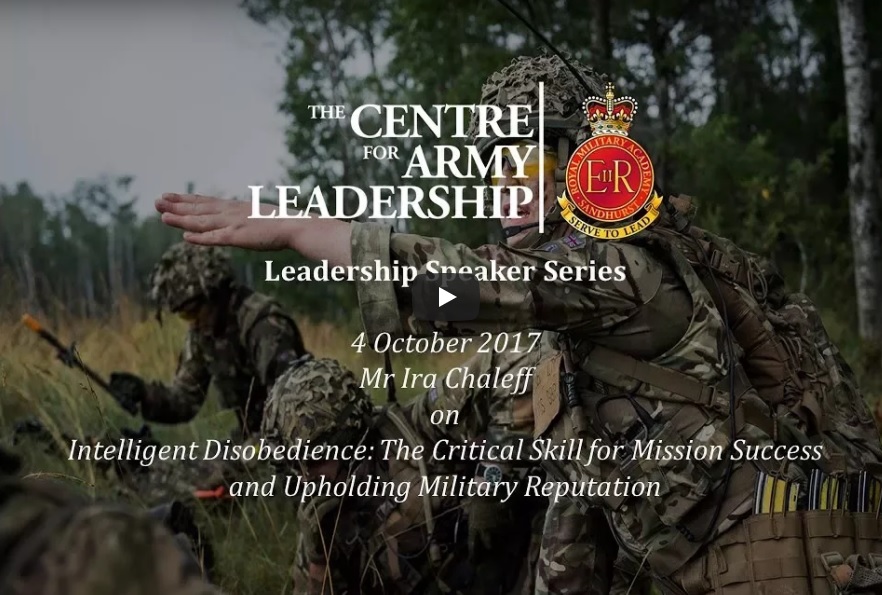Intelligent Disobedience by Ira Chaleff at the Centre for Army Leadership
Mr Ira Chaleff is one of the leading thinkers on followership. In this video he talks about intelligent disobedience: The critical skill for mission success and upholding military reputation. He explains why followers must be allowed to speak up to their leader and how a leader creates an environment where they allow followers to be disobedient if its the right thing to do. He discusses when to be intelligently disobedient, how to avoid doing it unintelligently, and gives a check list for followers to follow when they think they need to intervene.
His intelligent disobedience check list is:
- Observe the risk
- Pause the action
- Resist Obeying
- Counter-pull if needed
- Find safe alternatives
- Execute the new course of action
- Return the lead back to the leader
The video can be used as a good group session for all ranks. For junior soldiers – What is followership? When is it acceptable to disobey your leader? For leaders – should you encourage these behaviours, why and how? The focussed questions at the bottom will allow you to delve deeper into the issues in the video.
Focused Questions:
- Intelligent Disobedience only works if the followers truely understand why they are doing something and why the rules say they shouldn’t do something else. Do you do enough ensure soldiers understand the why?
- Is Intelligent Disobedience the right term? Do you think the Army is ready to talk about disobedience?
- Ira talks about an officer getting his subordinate to say “Sir, that’s BS!” to his face until the subordinate is comfortable with doing it. Is this a good idea? What underpins a relationship like that. Could you do this with your leader?
- Is there a right and a wrong time to be intelligently disobedient? Is there a right way and a wrong way? Discuss Gen Tyrone Urch’s quote “Before the decision, challenge; after the decision, obedience”. Do you agree?
- What could we do in this unit to make Intelligent Disobedience work? Or is the whole idea a disaster?
- What is the relationship between mission command and Intelligent Disobedience?
- Check out Ira’s check list. Why is each bullet important? Why is the last bullet there?
For further questions, and useful resources, read The Intelligently Disobedient Soldier published by the Centre for Army Leadership here, The Army Leader’s article on speaking truth to power here and an article by the Wavell Room here.
Resources:








The former US Marine turned blogger/journalist Michael Yon was embedded with (IIRC) 9/12th Lancers in Iraq and observed them taking an enemy position. The Sqn OC called in an airstrike with the FAC and one of his section commanders challenged the validity of the order as he had a perspective that allowed him to see civilians on the target that the OC could not, and the OC held the order as a result until both he and his Cpl were content that the target was clear. Yon commented that he would never have seen this happen in the context of the US Marines/Army because (as I can recall paraphrasing him) the US Cpl would never have the confidence to challenge what he knew to be a potentially bad order, and even if he had the commander probably wouldn’t have listened.
Intelligent disobedience has been ingrained in the British Army ethos for as long as our soldiers have had a healthy disdain for blindly following the orders of their officers.